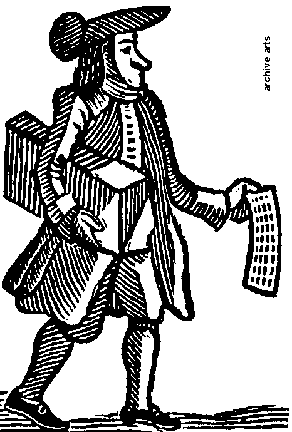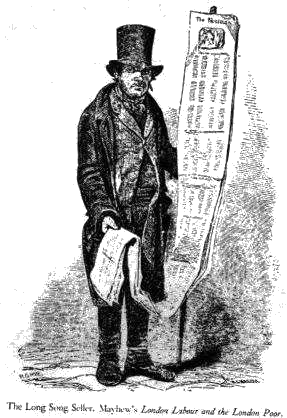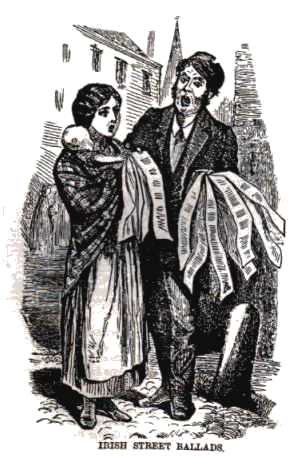The ballads which have lately been written, and published expressly for the street sale, and have proved the most successful, are parodies or imitations of `The Gay Cavalier.' One street ballad, commencing in the following words, was, I am told, greatly admired, both in the streets and the public-houses:
Twas a dark foggy night,
And the moon gave no light,
And the stars were all put in the shade:
When leary Joe Scott,
Dealt in `Donovan's hot'
Said he'd go to court his fair maid.
A large number of ballads which I procured, and all sold and sung in the street, though not written expressly for the purpose, presented a curious study enough. They were of every class: `Ye Banks and Braes o' Bonnie Doun,' `The Merry Fiddler,' (an indecent song) - `There's a good Time coming, Boys,' `Nix, my Dolly,' `The Girls of - shire,' (which of course is available for any county) - `Widow Mahoney,' `Remember the Glories of Brian the Brave,' `Clementina Clemmins,' `Lucy Long,' `Erin Go Bragh,' `Christmas in 1850,' `The Death of Nelson,' `The Life and Adventures of Jemmy Sweet,' `The Young May Moon,' `Hail to the Tyrol,' `He was sich a Lushy Cove,' &c. &c.
Some of these ballads have an illustration always at the top of the column. `The Heart that can Feel for Another' is illustrated by a gaunt and savage-looking lion. `The Amorous Waterman of St. John's Wood,' presents a very short, obese, and bow-legged grocer, in top-boots, standing at his door, while a lady in a huge bonnet is taking a sight at him, to the evident satisfaction of a baked 'tater man. `Rosin the Beau' is heralded by the rising sun. "`he Poachers' has a cut of the Royal Exchange above the title. `The Miller's Ditty' is illustrated by a perfect dandy, of the slimmest and straightest fashion; and `When I was first Breeched,' by an engraving of a Highlander.
Of the Experience of a Street Author, or Poet
I was very fond of reading poems, in my youth, as soon as I could read and understand almost. Yes, very likely, sir; perhaps it was that put it into my head to write them afterwards. Above fourteen years ago I tried to make a shilling or two by selling my verses. The first song I ever sold was to a concert-room manager. The next I sold had great success. It was called the `Demon of the Sea,' and was to the tune of `The Brave Old Oak.' It began:
Unfurl the sails,
We've easy gales;
And helmsman steer aright,
Hoist the grim death's head -
The Pirate's head -
For a vessel heaves in sight!
That song was written for a concert-room, but it was soon in the streets, and ran a whole winter. I got only 1s. for it. I'm very sorry indeed that I can't offer you copies of some of my ballads, but I haven't a single copy myself of any of them, not one, and I dare say I've written a thousand in my time, and most of them were printed. I believe 10,000 were sold of the `Husband's Dream.' It begins:
O Dermot, you look healthy now,
Your dress is neat and clean;
I never see you drunk about,
Then tell me where you've been.
Your wife and family - are they well?
You once did use them strange:
O, are you kinder to them grown,
How came this happy change?
Then Dermot tells how he dreamed of his wife's sudden death, and his childrens' misery as they cried about her dead body, while he was drunk in bed, and as he calls out in his misery, he wakes, and finds his wife by his side. The ballad ends:
I pressed her to my throbbing heart,
Whilst joyous tears did stream;
And ever since, I've heaven blest,
For sending me that dream.
Dermot turned teetotaller. The teetotallers were very much pleased with that song. The printer once sent me 5s. on account of it.
I have written all sorts of things. I've been asked to write indecent songs, but I refused. One man offered me 5s. for six such songs. - Why, that's less than the common price, said I, instead of something over to pay for the wickedness. - Live hard! yes, indeed, we do live hard. I hardly know the taste of meat. We live on bread and butter, and tea; no, not any fish. For the comings in, and what we have from the parish, must keep six of us - myself, my wife, and four children. It's a long, hard struggle.
If ever I am rich enough to provide for a tomb-stone, or my family is rich enough to give me one, this shall be my epitaph:
Stranger, pause, a moment stay,
Tread lightly o'er this mound of clay.
Here lies J - H - , in hopes to rise,
And meet his Saviour in the skies.
Christ his refuge, Heaven his home,
Where pain and sorrow never come.
His journey's done, his trouble's pest,
With God he sleeps in peace at last.
Of the Street-Sellers of Broad-Sheets and Song-Books
The broad-sheet known in street-sale is an unfolded sheet, varying in size, and printed on one side. The word is frequently used to signify an account of a murder or execution, but it may contain an account of a fire, an awful accident and great loss of life, a series of conundrums, as in those called Nuts to Crack, a comic or intended comic engraving, with a speech or some verses, as recently in satire of the Pope and Cardinal Wiseman, or a bill of the play.
The sale of song-books in the streets is smaller than it was two years ago. One reason that I heard assigned was that the penny song-books - styled `The Universal Songbook,' `The National,' `The Bijou,' &c. - were reputed to be so much alike (the same songs under a different title), that people who had bought one book were averse to buy another. There's the `Ross' and the `Sam Hall' song-books, said one man, the `eighteenth series,' and I don't know what;
 but I don't like to venture on working them, though they're only a penny. There's lots to be seen in the shop-windows; but they might be stopped in the street, for they an't decent - 'specially the flash ones.
but I don't like to venture on working them, though they're only a penny. There's lots to be seen in the shop-windows; but they might be stopped in the street, for they an't decent - 'specially the flash ones.
One of the books which a poor man had found the most saleable is entitled, `The Great Exhibition Songbook; a Collection of the Newest and Most Admired Songs. Embellished with upwards of one Hundred Toasts and Sentiments.' To show the nature of the songs in street demand, I cite those in the book: `The Gathering of the Nations,' `Bloom is on the Rye,' `Wilt thou Meet me there, Love?' `Minna's Tomb,' `I'll Love thee ever Dearly' (Arnold), `When Phoebus wakes the Rosy Hours,' `Money is your Friend,' `Julia and Caspar' (G.M. Lewis), `That pretty word, Yes' (E. Mackey), `Farewell, Forget me Not,' `The Queen and the Navy' (music published by H. White, Great Marlborough-street), `I resign Thee every Token' (music published by Duff and Co.), `Sleep, gentle Lady;' a serenade (H. J. Payne), `The Warbling Waggoner,' `The Keepsake,' `A Sequel to the Cavalier,' `There's room enough for All' (music at Mr. Davidson's), `Will you Come to the Dale?' `Larry O'Brian,' `Woman's Love,' `Afloat on the Ocean' (sung by Mr. Weiss, in the Opera of the `Heart of Mid Lothian,' music published by Jefferys, Soho-square), `Together, Dearest, let us Fly' (sung by Mr. Braham, in the Opera of the `Heart of Mid Lothian,' music published by Jefferys, Soho-square), `The Peremptory Lover' (Tune - `John Anderson, my Joe'). There are forty-seven songs in addition to those whose titles I have quoted, but they are all of the same character.
The penny song-books (which are partly indecent), and entitled the `Sam Hall' and `Ross' Songsters, are seldom or never sold in the streets. Many of those vended in the shops outrage all decency. Some of these are styled the `Coal-Hole Companion,' `Cider-Cellar Songs,' `Captain Morris's Songs,' &c. The titles of some of the songs in these works are sufficient to indicate their character. `The Muff,' `The Two Miss Thys,' `George Robins's Auction,' `The Woman that studied the Stars,' `A Rummy Chaunt,' `The Amiable Family,' `Joe Buggins' Wedding,' `Stop the Cart,' `The Mot that can feel for another,' `The Irish Giant,' `Taylor Tim,' `The Squire and Patty.' Some titles are unprintable.
Of the Street-Sellers of Manuscript and Other Music
This trade used to be more extensively carried on in the streets than it is at present. The reasons I heard assigned for the decadence were the greater cheapness of musical productions generally, and the present fondness for lithographic embellishments to every polka, waltz, quadrille, ballad, &c., &c. People now hates, I do believe, a `bare' music-sheet, one street-seller remarked.
The street manuscript-music trade was, certainly, and principally, piratical. An air became popular perhaps on a sudden, as it was pointed out to me, in the case, of `Jump, Jim Crow.' At a musical publisher's, such an affair in the first bloom of its popularity, would have been charged from 2s. to 3s. 6d., twenty-five years ago, and the street-seller at that time, often also a book-stall keeper, would employ, or buy of those who offered them for sale, and who copied them for the purpose, a manuscript of the demanded music, which he could sell cheap in comparison.
A man who kept a second-hand book-stall, in a sort of arched passage in the New Cut, Lambeth, sold manuscript-music, and was often sadly bothered, he said, at one time by the musical propensities of a man who looked like a journeyman tailor. This man, whenever he had laid out a trifle at the book-stall, looked over the music, and often pulled a small flute from his pocket, and began to play a few bars from one of the manuscripts, and this he continued doing, to the displeasure of the stall-keeper, until a crowd began to assemble, thinking, perhaps, that the flute-player was a street-musician; he was then obliged to desist. Of the kind of music he sold, or of its mode of production, this street-bookseller knew nothing. He purchased it of a man who carried it to his stall, and as he found it sell tolerably well, he gave himself no further trouble concerning it. The supplier of the manuscript pencilled on each sheet the price it was to be offered at, allowing the stall-keeper from 50 to 150 per cent. profit, if the price marked was obtained. I haven't seen anything of him, sir, said the street-bookseller, for a long while. I dare say he was some poor musicianer, or singer, or a reduced gentleman, perhaps, for he always came after dusk, or else on bad dark days.
Although but partially connected with street-art, I may mention as a sample of the music sometimes offered in street-sale, that a book-stall keeper, three weeks ago showed me a pile of music which he had purchased from a waste collector, about eight months before, at 2½d. the pound. Among this was some MS. music. The music had, as regards three-fourths of it, evidently been bound, and had been torn from the boards of the book, as only the paper portion is purchased for waste. Some, however, were loose sheets, which had evidently never been subjected to the process of stitching. I now cite some of the titles of this street-sale: `Le Petit Tambour. Sujet d'un Grand Rondeau pour le Piano Forte. Composé par L. Zerbini,' `Di Tanti Palpiti. The Celebrated Cavatina, by Rossini, &c.' `Twenty Short Lessons, or Preludes in the most Convenient Keys for the Harp. Composed and Respectfully Dedicated to Lady Ann Collins. By John Baptist Meyer. Price 5s.' `An Cota Caol (given in the ancient Irish character). The Slender Coat,' `Cailin beog chruite na mbo (also in Irish). The Pretty Girl Milking the Cow.'
There are now no persons regularly employed in preparing MS. music for the streets. But occasionally a person skilled in music writing will, when he or she, I was told, had nothing better in hand, do a little for the street sale, disposing of the MSS. to any street-stationer or bookseller.
Links:
On Henry Mayhew
London Labour and the London Poor
Back to the content of FolkWorld Features
To the content of FolkWorld No. 26
© The Mollis - Editors
of FolkWorld; Published 10/2003
All material published in FolkWorld is © The
Author via FolkWorld. Storage for private use is allowed and welcome. Reviews
and extracts of up to 200 words may be freely quoted and reproduced, if source
and author are acknowledged. For any other reproduction please ask the Editors
for permission. Although any external links from FolkWorld are chosen with greatest
care, FolkWorld and its editors do not take any responsibility for the content
of the linked external websites.
FolkWorld - Home of European Music

Layout & Idea of FolkWorld © The
Mollis - Editors of FolkWorld
 Sometimes three slips were pasted together. The vendors paraded the streets with their three yards of new and popular songs for a penny. The songs are, or were, generally fixed to the top of a long pole, and the vendor cried the different titles as he went along. This branch of the profession is confined solely to the summer; it being impossible to exhibit the three yards in wet or foggy weather. The paper songs, as they fluttered from a pole, looked at a little distance like huge much-soiled white ribbons, used as streamers to celebrate some auspicious news. The cry of one man, in a sort of recitative, or, as I heard it called by street-patterers, sing-song, was, Three yards a penny! Three yards a penny! Beautiful songs! Newest songs! Popular Songs! Three yards a penny! Song, song, songs! Others, however, were generally content to announce merely Three yards a penny!
Sometimes three slips were pasted together. The vendors paraded the streets with their three yards of new and popular songs for a penny. The songs are, or were, generally fixed to the top of a long pole, and the vendor cried the different titles as he went along. This branch of the profession is confined solely to the summer; it being impossible to exhibit the three yards in wet or foggy weather. The paper songs, as they fluttered from a pole, looked at a little distance like huge much-soiled white ribbons, used as streamers to celebrate some auspicious news. The cry of one man, in a sort of recitative, or, as I heard it called by street-patterers, sing-song, was, Three yards a penny! Three yards a penny! Beautiful songs! Newest songs! Popular Songs! Three yards a penny! Song, song, songs! Others, however, were generally content to announce merely Three yards a penny!
 Bevis of Southampton, Guy of Warwick, Adam Bell, and Clymme of the Clough, and such other old romances or historical rhymes, made purposely for the recreation of the common people at Christmas dinners and bride ales, and in tavernes and alehouses, and such other places of base resort.
Bevis of Southampton, Guy of Warwick, Adam Bell, and Clymme of the Clough, and such other old romances or historical rhymes, made purposely for the recreation of the common people at Christmas dinners and bride ales, and in tavernes and alehouses, and such other places of base resort.
 but I don't like to venture on working them, though they're only a penny. There's lots to be seen in the shop-windows; but they might be stopped in the street, for they an't decent - 'specially the flash ones.
but I don't like to venture on working them, though they're only a penny. There's lots to be seen in the shop-windows; but they might be stopped in the street, for they an't decent - 'specially the flash ones.
